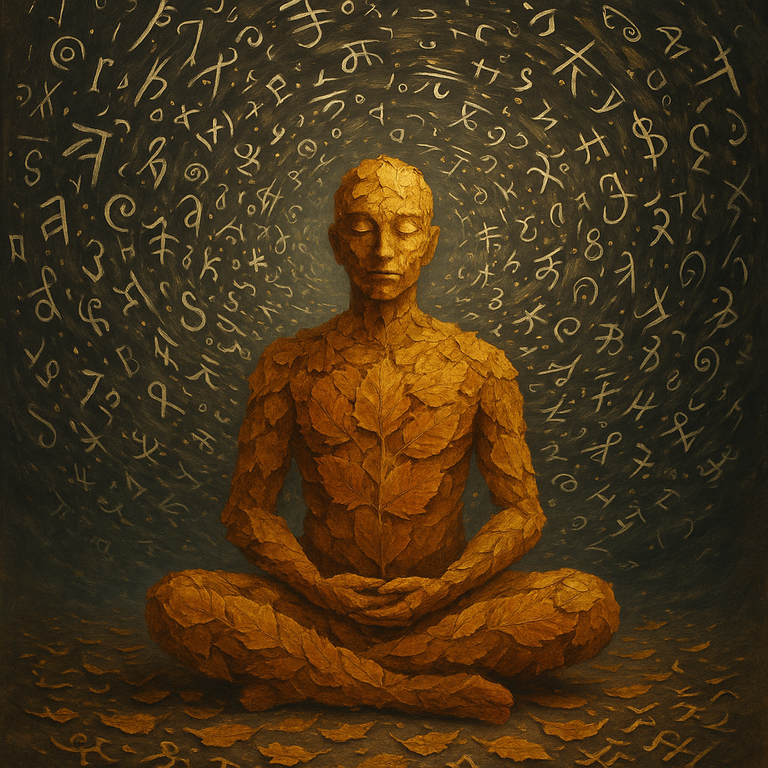Conscious silence

Make silence is one thing I have learned after decades of impulsiveness and blunders because silence is a strength that must be cultivated.
It wasn't always that way for me. For years, I responded without thinking, rushing headlong into arguments, defending my point at all costs... and many, many times I came out the loser. Sometimes, for being right at the wrong time.
Over time, I realized that not all battles are worth fighting... that some arguments are a bottomless pit from which nothing good can come. In those cases, silence protects me, saves me trouble, gives me time to think, allows me to observe and choose carefully when to speak and when not to.

Learning to be silent is not easy. It requires patience, humility, and often swallowing your pride. But in my case, it was one of the best decisions of my life. Because silence, when it is conscious, is not empty: it is wisdom.
I am a group therapist, and much of my learning came from group therapy sessions where I learned to listen without interrupting. To really listen. To let patients develop their story, their pain, their rhythm, and I understood that listening is essential to getting to know a person and also to maintaining a healthy relationship, whether it be friendship or love.
In my relationship with my partner, it also helped that I detest violence and shouting. When I argued with my husband, I let him talk and say what he had to say while I remained silent. Often, a simple “I'm sorry, you're absolutely right, I was wrong” was enough to end any argument. No shouting. No resentment.
Today, at 69, I don't regret having changed my impulse to pause, having chosen to be silent in order to listen, because in that silence ...I found serenity, understanding, and, above all, connection.
Silence allowed me to see beyond empty words, to understand what is not said, what is hidden behind a look, a gesture, a whisper. I became more empathetic, less reactive, more present in the here and now. I learned that not everything needs a response... that sometimes the other person just needs to feel heard, not corrected or confronted.

In therapy sessions, silence is a powerful tool. It allows me to give space to other people's emotions without invading them, to support without intervening, to accompany without directing. And that is worth more than any well-intentioned suggestion.
I'm not saying that silence solves everything. Of course, there are times when we have to speak up, set boundaries, say what we feel, and state our position on a situation. But the silence that precedes it helps us organize what we want to say, choose how to say it, and avoid hurting others unnecessarily.

It wasn't easy to keep quiet. Many times I swallowed burning words, heavy silences, and over time, those moments became spaces for reflection and self-care.
Today, I look back and am grateful for having learned to be silent because in that silence there was no resignation, but strength. There was no submission, but wisdom. And there was no loneliness, but a different and better way of being with others.
Silence taught me that listening is also loving and that often, serenity begins within, right where we stop defending ourselves and begin to understand ourselves.
IMAGES AI created by You
ESPAÑOL
SILENCIO CONSCIENTE
Guardar silencio es algo que he aprendido tras décadas de impulsividad y errores, porque el silencio es una fortaleza que hay que cultivar.
No siempre fue así para mí. Durante años, respondí sin pensar, metiéndome de lleno en las discusiones, defendiendo mi punto de vista a toda costa... y muchas, muchas veces salí perdiendo. A veces, por tener razón en el momento equivocado.
Con el tiempo, me di cuenta de que no todas las batallas valen la pena... que algunas discusiones son un pozo sin fondo del que nada bueno puede salir. En esos casos, el silencio me protege, me ahorra problemas, me da tiempo para pensar, me permite observar y elegir con cuidado cuándo hablar y cuándo no.
Aprender a guardar silencio no es fácil. Requiere paciencia, humildad y, a menudo, tragarse el orgullo. Pero en mi caso, fue una de las mejores decisiones de mi vida. Porque el silencio, cuando es consciente, no es vacío: es sabiduría.
Soy terapeuta de grupo, y gran parte de mi aprendizaje provino de sesiones de terapia grupal donde aprendí a escuchar sin interrumpir. A escuchar de verdad. A dejar que los pacientes desarrollaran su historia, su dolor, su ritmo, y comprendí que escuchar es esencial para conocer a una persona y también para mantener una relación sana, ya sea de amistad o amor.
En mi relación de pareja, también me ayudó el hecho de que detesto la violencia y los gritos. Cuando discutía con mi esposo, lo dejaba hablar y decir lo que tenía que decir mientras yo permanecía en silencio. A menudo, un simple "Lo siento, tienes toda la razón, me equivoqué" era suficiente para terminar cualquier discusión. Sin gritos. Sin resentimiento.
Hoy, a los 69 años, no me arrepiento de haber cambiado mi impulso de pausa, de haber elegido guardar silencio para escuchar, porque en ese silencio... encontré serenidad, comprensión y, sobre todo, conexión.
El silencio me permitió ver más allá de las palabras vacías, comprender lo que no se dice, lo que se esconde tras una mirada, un gesto, un susurro. Me volví más empática, menos reactiva, más presente en el aquí y ahora. Aprendí que no todo requiere una respuesta... que a veces la otra persona solo necesita sentirse escuchada, no corregida ni confrontada.
En las sesiones de terapia, el silencio es una herramienta poderosa. Me permite dar espacio a las emociones de los demás sin invadirlas, apoyar sin intervenir, acompañar sin dirigir. Y eso vale más que cualquier sugerencia bienintencionada.
No digo que el silencio lo resuelva todo. Claro que hay momentos en los que tenemos que hablar, poner límites, decir lo que sentimos y expresar nuestra postura ante una situación. Pero el silencio que lo precede nos ayuda a organizar lo que queremos decir, a elegir cómo decirlo y a evitar herir innecesariamente a los demás.
No fue fácil guardar silencio. Muchas veces me tragué palabras hirientes, silencios pesados, y con el tiempo, esos momentos se convirtieron en espacios de reflexión y autocuidado.
Hoy, miro atrás y agradezco haber aprendido a guardar silencio, porque en ese silencio no había resignación, sino fuerza. No había sumisión, sino sabiduría. Y no había soledad, sino una forma diferente y mejor de estar con los demás.
El silencio me enseñó que escuchar también es amar y que, a menudo, la serenidad nace en nuestro interior, justo cuando dejamos de defendernos y empezamos a comprendernos.